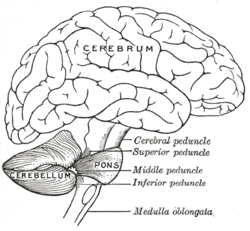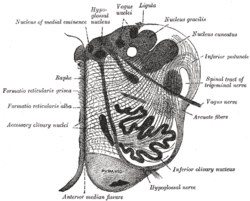The juxtarestiform body is the smaller, medial subdivision of each inferior cerebellar peduncle (the other, lateral one being the restiform body).[1]: 290
| Juxtarestiform body | |
|---|---|
 Scheme showing the connections of the several parts of the brain. (Inferior peduncle labeled at bottom right.) | |
 Section of the medulla oblongata at about the middle of the olive. (Inferior peduncle labeled at upper right. | |
| Details | |
| Identifiers | |
| Latin | Corpus juxtarestiforme |
| NeuroNames | 779 |
| NeuroLex ID | birnlex_1101 |
| TA98 | A14.1.04.119 A14.1.07.415 |
| TA2 | 5854 |
| FMA | 72613 |
| Anatomical terms of neuroanatomy | |
The juxtarestiform body contains mostly cerebellar afferents, but also some cerebellar efferents.[1]: 290
Anatomy
editAfferents
edit- Vestibulocerebellar fibers: include second-order fibers from the vestibular nuclei (project bilaterally) as well as a few first-order fibers from the vestibular ganglion/nerve (project ipsilaterally).[1]: 293 The fibers project to the vestibulocerebellum and cerebellar vermis (of the spinocerebellum)[1]: 290 as well as to (ipsilateral and contralateral) fastigial and dentate nuclei.[1]: 402
Efferents
edit- Cerebellovestibular fibers:[1]: 290-291 arise from Purkinje cells of the flocculonodular lobe of the cerebellum.[1]: 297
- Fastigiovestibular fibers: mainly project to both ipsilateral and contralateral lateral and inferior vestibular nuclei to influence both vestibulospinal tracts.[1]: 292
- Fastigiobulbar fibers: project bilaterally to the (medullary and pontine) reticular formation to influence both reticulospinal tracts (but mostly the contralateral one).[1]: 292
- Cerebelloreticular fibers[1]: 290-291
Function
editThe juxtarestiform body coordinates balance and eye movements by communication between the vestibular apparatus and the cerebellum.[citation needed]
Additional images
edit-
Cerebellum:—Inferior surface showing inferior cerebellar peduncle
-
Upper part of medulla spinalis and hind- and mid-brains; posterior aspect, exposed in situ.